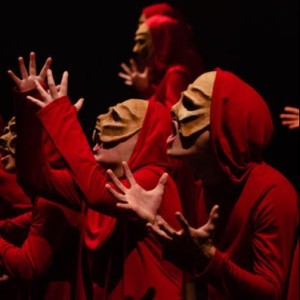
Genre: Tragedy
Introduction
Tragedy on stage is thousands of years old. In Ancient Greece, playwrights entered competitions during the Festival of Dionysus. Meaning “goat song,” the best tragedy is thought to have been originally awarded with a goat (although this story is somewhat in dispute). Even though playwrights are no longer given livestock for great shows, the principles of tragedy are still influenced by what the ancient writers developed within their plays.
Terminology
- Catharsis: A term from Ancient Greek tragedy, meaning the purging of pity and fear .
- Epiphany: Also called “anagnorisis” in Ancient Greek tragedy, this is the recognition by the hero of his tragic fate, and his inability to change it.
- Hamartia: A tragic flaw, identified within Ancient Greek tragedy.
- Hubris: Excessive pride, the most common tragic flaw.
- The Poetics: Ancient treatise by Aristotle that sets out the rules of dramatic poetry, including comedy and tragedy.
- Revenge Tragedy: The protagonist, called to revenge by someone who has been wronged (usually the ghost of a family member).
- Tragic Hero: The protagonist, generally someone who is noble or royal, and is brought to a downfall by their own hubris.
Context & Analysis
While the genre of tragedy in Western theatre has existed for over 2000 years, its basic principles are the same: Ultimately, a hero has a profound downfall that resets the course of their life. In Ancient Greece, the philosopher Aristotle wrote The Poetics, which reflected on what made a successful tragic play. He looked at the big three tragic playwrights of Ancient
to read our learning module for Genre: Tragedy and to unlock other amazing theatre resources!StageAgent Resources
StageAgent Sections
Guides
Writer Guides:
- Aeschylus
- Sophocles
- Euripides
- Seneca
- William Shakespeare
- Thomas Kyd
- Jean Racine
- Arthur Miller
- Eugene O’Neill
- Langston Hughes
- John Millington Synge
Show Guides:
- Oedipus
- Hamlet
- Othello
- The Spanish Tragedy
- Phaedra
- Death of a Salesman
- Long Day’s Journey Into Night
- Mulatto: A Tragedy of the Deep South
- Riders to the Sea
Performing Guides:
Theatre History:
- Ancient Greek Theatre
- Ancient Roman Theatre
- English Renaissance Theatre
- French Neoclassical Theatre
- Realism
- Naturalism
- Symbolism
Learning Module: Shakespeare in Context
Blog Posts
Links & Media
Quizzes

Cindi Calhoun
Theatre teacher, director, writer, and seamstress